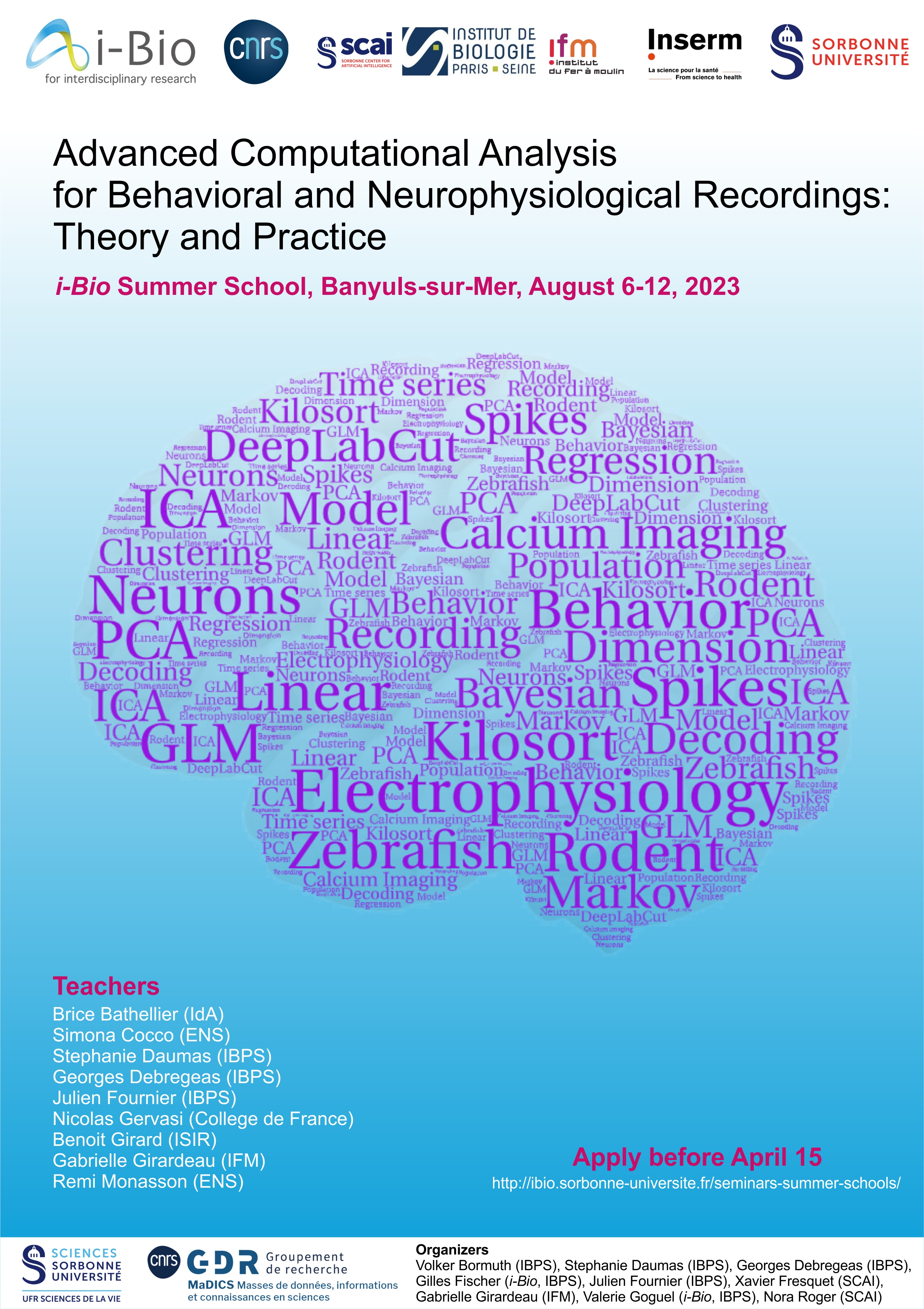Summer school Banyuls-sur-Mer, 6-12 August 2023
“Advanced Computational Analysis for Behavioral
and Neurophysiological Recordings”
The recent years have seen the explosion of high-throughput neural recording methods: hundreds of individual neurons can now be monitored simultaneously using large-scale functional imaging or multisite electrode arrays. A comparable trend is observed in behavioral studies where new imaging technology produces high-resolution imaging of complex behaviors.
In order to extract meaningful information from these high-dimensional datasets, neurobiologists need to develop and use robust computational methods. This Summer school aims at addressing this need by offering theoretical as well as direct practical exposure to computational tools used in modern neuroscience to interpret high dimensional neurophysiological and behavioral signals associated to complex behaviors.
Morning sessions will be dedicated to lectures covering the theoretical and experimental background required to understand the state-of-the-art computational techniques used in modern neuroscience. During the afternoons, these techniques will be effectively implemented during practical hands-on sessions, in which participants will learn to use them on actual data. Participants will choose in advance a specific dataset on which they will work for the entire workshop. Several datasets will be proposed to the students, comprising hippocampal electrophysiological recordings in rodents, whole-brain calcium imaging data in zebrafish larvae and behavioral data of freely moving animals.
This workshop will cover the following topics: behavioral tracking, spike sorting and spike inference, regression analyses and decoding, dimensionality reduction and clustering methods, time series analyses. It is mainly intended for PhD students and post-docs working on behavioral and/or neurophysiological data who are interested in using or developing these computational methods in their own project.
TEACHERS:
• Brice Bathellier (IdA, Institut Pasteur, Université de Paris, Inserm)
• Simona Cocco (LPENS, ENS, Université PSL, CNRS, Sorbonne Université, Université de Paris)
• Stéphanie Daumas (NPS, IBPS, Inserm, CNRS, Sorbonne Université)
• Georges Debrégeas (LJP, IBPS, CNRS, Sorbonne Université)
• Julien Fournier (NPS, IBPS, Inserm, CNRS, Sorbonne Université)
• Nicolas Gervasi (CIRB, College de France, Inserm)
• Benoît Girard (ISIR, CNRS, Sorbonne Université)
• Gabrielle Girardeau (IFM, Inserm, Sorbonne Université)
• Rémi Monasson (LPENS, ENS, Université PSL, CNRS, Sorbonne Université, Université de Paris)
PROGRAM:
Day 1: Behavioral analyses and data preprocessing
Day 2: Regression analysis and decoding
Day 3: Dimensionality reduction and clustering methods
Day 4: Time series analysis
Day 5: Computational modeling, discussions and reporting
AUDIENCE
This workshop is meant for PhD students and post-doctoral fellows in Neuroscience who intend to use or develop computational methods to analyze neurophysiological and/or behavioral data. Applicants should have a minimal background in programming. A maximum of 20 participants will be selected.
VENUE
The school will take place at the Marine Biological Station of Banyuls-sur-Mer: https://www.obs-banyuls.fr/en/.
Information on how to get there can be found at: https://www.obs-banyuls.fr/en/host/how-to-get-here.html.
REGISTRATION
Please fill this form to apply. Application deadline April 15, 2023.
The registration fees are 100 euros, and cover housing and food.
ORGANIZATION
The school is co-organized by i-Bio and SCAI.
Organizers: Volker Bormuth (LJP, IBPS, Sorbonne University), Stephanie Daumas (NPS, IBPS, Sorbonne University), Georges Debregeas (LJP, IBPS, Sorbonne University), Gilles Fischer (i-Bio, IBPS, Sorbonne Universite), Julien Fournier (IBPS, NPS, Sorbonne Universite), Xavier Fresquet (SCAI, Sorbonne universite) Gabrielle Girardeau (IFM), Valerie Goguel (i-Bio, IBPS), Nora Roger (SCAI, Sorbonne universite)

